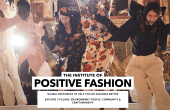Though fashion schools produce thousands of design graduates each year, many of whom fail to launch their own labels or find jobs as designers at fashion houses, the fashion business and adjacent industries need graduates with fashion design degrees like never before, argues Professor Frances Corner, head of London College of Fashion.

Nadine Ijewere. BA (Hons) Fashion Photography
Are we producing too many fashion designers? Those posing the question usually assume that a fashion design education should lead directly to a job as a designer at a fashion brand, probably at one of the famous luxury houses. This is based a number of erroneous assumptions.
First, it supposes that education is about training and preparing “oven-ready chickens” for the industry. No-one expects a history graduate to become an historian automatically. Equally a fashion degree, with one foot in industry and one in education, does not and should not concentrate on training students for the industry to the detriment of developing their creative and entrepreneurial skills.
Second, it posits a narrow definition of the fashion industry. Nowadays, the industry needs graduates with an understanding and experience of design, but not necessarily to work as designers. Fashion drives so many industries and economies: it provides the value-added, design-focused element that makes consumers happy to splash out on something because it is fashionable — that may be a piece of clothing, an accessory, furniture, food or the latest mobile device. Fashion is everywhere.
Add to this, the Internet, the development of digital technologies and the blurring of the traditional boundaries between creative subjects and the lines where fashion ends and film, graphics, media, music, retailing and beauty begin become difficult to define. These industries are crying out for people whose education equips them to understand the role of design in our society and our economy; so the opportunities for well prepared, fashion design graduates, who understand the complexity and spread of these global creative industries are numerous.
As the world’s oldest educational institution focusing entirely on fashion, London College of Fashion provides courses that serve the breadth of the contemporary industry. With accreditation from the Association of Business Schools, we are running the first EMBA in fashion. Our portfolio has grown significantly to meet the requirements of a non-design fashion sector. Over the last 15 years our undergraduate offer has expanded from less than seven courses to just over 40, with 60 percent non-design. Postgraduates now have a choice of 28 courses, with 71 percent non-design.
About three-quarters of our students are in work six months after graduation. In journalism this is 90 percent (with 65 percent in managerial roles) and for our BA management course it’s 85 percent (with 80 percent in a managerial role). What’s more, over half of our second year students looking for accredited work placements want non-design opportunities, be they retail management, marketing, visual merchandising, media and photography — or within sectors including journalism, filmmaking and PR. Indeed, our non-design courses often provide a set of skills which transfer easily into other creative sectors like journalism, photography, media, marketing and management.
As educators, we use the opportunity to challenge the definition of fashion amongst the future generations of the industry and question the very nature of the industry, its values and structure. Students come to understand that fashion is more than the design of clothing and related products. Thus, we encourage them to engage with other areas of equal importance within the industry: the communication of fashion, the science of fashion, the ethics of fashion and the business of fashion.
The future fashion industry needs creative, innovative, visual thinkers and these are abilities often sought in managers and senior leaders in just about every sector, not only fashion. The industry will also need graduates with skills that were never considered before simply to keep abreast of an ever-growing and sophisticated global market that is increasingly digital and technologically focused. The fashion psychologist, the fashion retailer with expertise in the over-60s market, the fashion 3-D printer, the fashion software developer whose focus is the future of e-commerce; these are the sorts of jobs that the fashion industry requires. However, at the heart of all these roles is an education in fashion design.
Article for Business of Fashion. February 2014.




